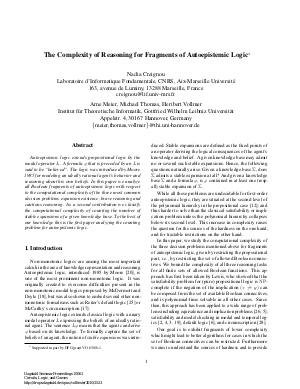The Complexity of Reasoning for Fragments of Autoepistemic Logic
Authors Nadia Creignou, Arne Meier, Michael Thomas, Heribert Vollmer
-
Part of:
Volume:
Dagstuhl Seminar Proceedings, Volume 10061
Part of: Series: Dagstuhl Seminar Proceedings (DagSemProc) - License:
 Creative Commons Attribution 4.0 International license
Creative Commons Attribution 4.0 International license
- Publication Date: 2010-04-26
File

PDF
DagSemProc.10061.6.pdf
- Filesize: 292 kB
- 10 pages
Document Identifiers
Subject Classification
Keywords
- Autoepistemic logic
- computational complexity
- nonmonotonic reasoning
- Post's lattice
Metrics
- Access Statistics
-
Total Accesses (updated on a weekly basis)
0Document
0Metadata
Abstract
Autoepistemic logic extends propositional logic by the modal operator L. A formula that is preceded by an L is said to be "believed". The logic was introduced by Moore 1985 for modeling an ideally rational agent's behavior and reasoning about his own beliefs. In this paper we analyze all Boolean fragments of autoepistemic logic with respect to the computational complexity of the three most common decision problems expansion existence, brave reasoning and cautious reasoning. As a second contribution we classify the computational complexity of counting the number of stable expansions of a given knowledge base. To the best of our knowledge this is the first paper analyzing the counting problem for autoepistemic logic.
Cite As Get BibTex
Nadia Creignou, Arne Meier, Michael Thomas, and Heribert Vollmer. The Complexity of Reasoning for Fragments of Autoepistemic Logic. In Circuits, Logic, and Games. Dagstuhl Seminar Proceedings, Volume 10061, pp. 1-10, Schloss Dagstuhl – Leibniz-Zentrum für Informatik (2010)
https://doi.org/10.4230/DagSemProc.10061.6
BibTex
@InProceedings{creignou_et_al:DagSemProc.10061.6,
author = {Creignou, Nadia and Meier, Arne and Thomas, Michael and Vollmer, Heribert},
title = {{The Complexity of Reasoning for Fragments of Autoepistemic Logic}},
booktitle = {Circuits, Logic, and Games},
pages = {1--10},
series = {Dagstuhl Seminar Proceedings (DagSemProc)},
ISSN = {1862-4405},
year = {2010},
volume = {10061},
editor = {Benjamin Rossman and Thomas Schwentick and Denis Th\'{e}rien and Heribert Vollmer},
publisher = {Schloss Dagstuhl -- Leibniz-Zentrum f{\"u}r Informatik},
address = {Dagstuhl, Germany},
URL = {https://drops.dagstuhl.de/entities/document/10.4230/DagSemProc.10061.6},
URN = {urn:nbn:de:0030-drops-25234},
doi = {10.4230/DagSemProc.10061.6},
annote = {Keywords: Autoepistemic logic, computational complexity, nonmonotonic reasoning, Post's lattice}
}
